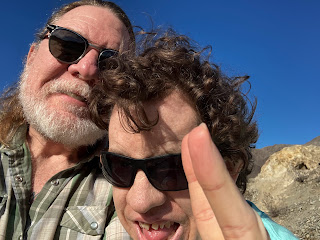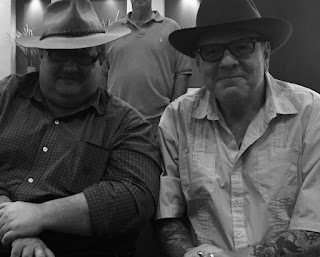A: Anything I’ve ever written that I felt was of value, came from a place of pure intuition. My most intricate and well laid out plans inevitably led me to drivel. I wish that wasn’t true. If I knew how to come up with the big idea and then write it, I would. Just isn’t how my process works.
What pulls me into an idea? I am attracted to writing about worlds and genres I haven’t done before. The challenge of the unknown excites and terrifies me. But that is often a secondary consideration. First thing that gets my attention is a glimmer I see in my periphery. Stare too intently it will disappear. I will think about it while walking in the woods. With no pressure to develop it farther.
I was eleven years old when I fell in love with the film Butch Cassidy and the Sundance Kid. I read anything I could find on the real life outlaws. In a book written by Butch Cassidy’s sister I discovered the true story of how it ended. After that famous freeze frame, Sundance was dead, Butch wasn’t so lucky. This tickled my pre-teen creative brain. Four years later I heard The Who’s Behind Blue Eyes. In a flash I saw a film I wanted to write. I wanted to tell the story of Butch’s life after Sundance was killed. How did he go back to ranching after all he’d seen and done? I never got that story written, but it still feels like a cool idea.
Elvis Costello’s Oliver’s Army led me to write a screenplay about a young man who lies to a group of mercenaries, telling them about his demolitions expertise. It wasn’t bad, almost got made for a minute. Point is those two ideas sparked from listening to music.
My most recent work came from driving with my son Dylan making up songs. By accident we came up with the theme song to a story that didn’t exist. So I decided I should write it. Like a faithful detective I have hunted that story down, following the leads where they take me.
One of the concepts I felt strongly about in TRICKY was the danger of confirmation bias. Bad things happen when a homicide detective believes they know what happened before they have all the facts. The same applies to writing, but with less dire consequences. If I believe I have all the answers I will never discover the truth in a story. Knowing everything limits what I learn along the way.
Does this sound crazy? Yes, it does. But it’s the only way I know to access the intuitive part of my brain. The part that knows what I don’t know.
Sometimes I know a character from page one, Cisco in TRICKY was based on Dylan. But as I wrote he slowly morphed into his own person. Cisco has Dylan’s humor. But Cisco also carries a heavy load of guilt. Cisco worries that his past makes him a bad man. Dylan seems sure he’s a good guy who makes mistakes. I wouldn’t have discovered these differences if I had decided I already knew who was who and how they should be reacting. I try to take this into real life. Realizing I know very little about what other people are thinking or feeling, allows my view of them to evolve.
Sidebar: Is there anything worse than having come up with a very clever plot turn only to discover that your character wouldn’t do what you have them doing?
My first book Beautiful Naked & Dead started from an opening line that I heard in my head. That opening line is the only thing that survived all the many drafts. And it is still the best opening I’ve written. It contained the entire DNA sequence of what the novel would become.
Regardless of where the spark comes from, I am aware of how damn hard writing a book is. It’s also joyous and thrilling and frustrating and big fun and hard work. To take the writing of a book on I need to find a reason to fall in love with it.
A couple of days ago Erika and I celebrated our 44th Valentine's Day together. That’s a long time to love someone. And it all started when I met a pretty girl with a sweet smile, a wicked intelligence, and a strong heart that called to me. Along the way it’s been hard work mixed with long days of riotous joy. Sometimes we cut each other deep. Danger of pain from unintentional cruelty comes in equal proportions to how much and how long you love a person. I have felt loving support and tender words at the exact moment I needed them.
The late night I asked Erika to marry me, I was a scared kid running from everything. There was no logical reason for us to expect getting hitched was a good idea. At the time I dreamed of making it in film or theater, but I had no job or backup plan. All I had was a deep feeling that this was the correct next move. Pure intuition. Faith in her. Faith that I wouldn’t irrevocably fuck it up. Turns out by trusting our guts we beat the odds.
This is the same as falling in love with a story idea. Intuitively I have to know that it won’t be easy but the book will be worth whatever the cost it extracts from me.
All faith is blind.
Following intuition is by definition illogical.
It is also the only way I know to discover stories worth writing.
******
My latest reads:
Chain Gang All Stars by Nana Kwame Adjei-Brenyah. The New York Times named this one of the 10 best books of 2023. It is one of the best novels on incarceration in the USA. It is a dystopian world where prisoners can fight and kill each other for reduced sentences. But it is so much more, it speaks to the morals involved with who we as a nation are becoming. It also has flawless footnotes to keep you tethered to the factual basis of the not far fetched story. It isn’t for the squeamish, but damn it is important.
City of the Beast by Isabel Allende, translated from Spanish to English by Margaret Sayers Peden. Published in 2002. A fun YA book set in the Amazonian rain forest. While on an anthropological search two teenagers come in contact with real magic and local gods. My only problem with the book was its use of the word “Indian” to describe the indigenous people. This may be from the translation, or it may just be that in the last twenty years we’ve learned to use more accurate language when speaking of first nation folk.






















